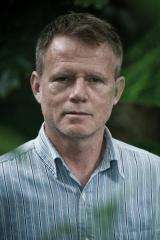Bob Walker, MSU geography professor, argues that many of Brazil's environmental policies to protect the Amazon are working. Credit: Michigan State University
During his unprecedented expedition into the heart of the Amazon, Michigan State University geographer Bob Walker discovered surprising evidence that many of the Brazilian government's efforts to protect the environment are working.
As expected, Walker and two fellow scientists - the first research team to travel a 700-mile stretch of the so-called Transamazon Highway in the western Amazon basin - confirmed the existence of illegal logging and gold-mining operations that threaten further damage to the world's largest rainforest.
But the researchers also found massive areas of undisturbed forest in the form of nationally protected areas and indigenous reserves - as well as examples of where the government had halted unofficial road building, Walker said.
"We were kind of amazed by the number of good stories we actually saw," said Walker, a veteran Amazon researcher whose work is funded by the National Science Foundation. "The environmental enforcement agencies in Brazil often do seem to be doing what they're supposed to do."
An estimated 17 percent of the Brazilian rainforest has been destroyed, much of it in the more developed eastern Amazon basin. Due to a government crackdown on illegal logging, Walker suspected loggers were moving such illegal operations westward - deep into the Amazon - but he needed to confirm it.
In late June, he made the 10-day trip along the western Transamazon Highway, by truck, with Brazilian colleagues Eugenio Arima, assistant professor at Hobart and William Smith Colleges, and Ritaumaria Pereira, MSU doctoral candidate. That section of the highway, from Itaituba to Labrea, is unpaved and unchartered - a wild stretch of jungle that Walker had assumed was becoming the new logging frontier.
It is, he said. The researchers witnessed fairly sizable logging operations, including sawmills and semi-trucks hauling out sawn wood. This is particularly significant, Walker said, because the western Amazon basin may very well represent the rainforest's best hope to survive. Many experts believe too much deforestation could trigger a catastrophic change - or tipping point - that changes the Amazon from tropical forest to dry scrubland.
"The western Transamazon Highway has become the battleground for that tipping point," Walker said.
Mining is another environmental threat to the region. A gold rush several years ago attracted thousands of people and tore up a section of rainforest. Walker and colleagues documented a gold mine in Apui where the mining machines had stopped due to a protracted court battle, although 200 to 300 people were still panning for gold by hand.
"If you get another huge gold rush into that region you could set up this tidal wave of demand for land," Walker said. "That's something to be concerned about."
But the biggest surprise of the trip was witnessing multiple examples of how the government's conservation efforts are working, Walker said. Driving through the Amazon National Park, he said he encountered dense, plush jungle - refuting critics' claims that protected areas in the Amazon are nothing but "paper parks," or parks only on paper.
The researchers also were encouraged by the existence of indigenous reserves - land set aside for native peoples, as opposed to potentially harmful development. "There were Indian villages along significant stretches of the Transamazon Highway," Walker said.
And then there was the instance of a village mayor allowing loggers to come in and start building a road that would have connected the western Amazon basin to developed areas to the south, potentially creating an environmentally-devastating corridor of growth. But the federal government shut the road down before that could happen, Walker said.
The research supports a recent scientific study led by Walker that contends Brazil's conservation efforts - even with the prevalence of illegal logging - are extensive enough to ultimately protect the Amazon. That study, funded by NASA, was based on three years of atmospheric computer modeling.
Walker said he's no "apologist for development" and that he "doesn't want to glad-hand the private sector and say the pathway to a brilliant future is the absence of regulation. We saw what can happen there with the British Petroleum oil spill in the Gulf of Mexico."
Ultimately, he said, the answer lies somewhere in the middle - that is, sustainable growth that protects both the environment and the livelihoods and culture of Brazil's citizens.
"There seems to be an emerging Brazilian will to fulfill the intentions of protected areas," Walker said. "There are still many environmental concerns, and we certainly can't say the battle's won and we can all go home and pat ourselves on the back. But one thing they're not doing is giving people a complete license to deforest the Amazon."
Provided by Michigan State University



















